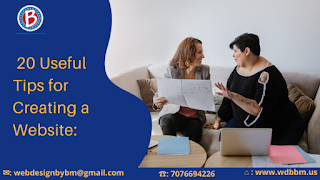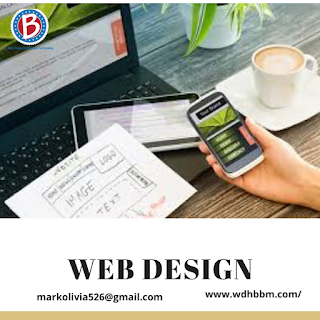20 Useful Tips for Creating a Website:
Before you begin development, read these 20 simple but
useful tips for web design & development that will help you when creating a
site:
·
For the correct positioning of a business, the
answers to the following questions are important: what kind of company do you
have, for whom do you work, what information about yourself and your business
do you want to share, who are your competitors and what distinguishes you from
them.
·
Significantly saves time the organizational
structure of the site worked out on paper before the direct work on creating
the site begins.
·
A “click” on the company logo must necessarily
lead to the transfer of the visitor to the main page of the site.
·
Information is the basis of any site. Think
about how you plan to fill the site, where exactly you will get the information
necessary for this. Remember: unique content on a site is not only the key to
the proper promotion of a resource in search engines but first of all respect
for visitors and their interest and attention to the information presented on
your site.
·
Decide on the corporate color, fonts, and logo. The design should reflect the core values of your company. The color scheme should
be determined in accordance with the colors of the corporate identity of the company, as well as the color preferences of the target audience.
·
Do not disregard the “Share” block, which helps
site visitors quickly publish links to articles of interest to them from your site on social networks and blogs.
·
Prepare materials planned for the site in
advance. In addition to texts, you need to find suitable graphic, audio and
video materials, because the text cannot convey as much information as the text
in combination with several well-chosen complementary elements.
·
A site for business should contain information
in the amount necessary and sufficient for a potential buyer to become a real
buyer.
·
The pages should contain an advertising slogan
(motto, slogan) that clearly describes what the company is doing.
·
Incomplete pages or pages under reconstruction
are negatively affecting the image. Introduce the site to Internet users only
after all its web pages are completely finished.
·
In a prominent place on the main page must be
contact information. Indeed, visitors often re-enter the site in search of this
particular information.
·
There should be a map on the “contacts” page for an easier search of your location.
·
Use modern, easy to read, eye-catching fonts.
Refrain from using artsy fonts that make reading difficult.
·
The page headings should be succinctly concise,
but descriptive, carrying a maximum of information with a small number of
words.
·
Graphic elements should reflect the real content
of the site, and not serve only as its decoration.
·
Do not underestimate the footer - the block at
the bottom of the page where useful information is posted. For example, a site
map, alternative site navigation, duplicate contact details, social network
icons.
·
Avoid obsessiveness in offering visitors various
advertising subscriptions and notifications. It is also worth being careful
when creating a pop-up window with a feedback form, choosing in favor of
maximum invisibility and unobtrusiveness.
·
When creating a site, observe restraint in the
transfer of awards. Choose the victories that are most significant for the
company and your industry as a whole.
·
The Internet does not stand still, tracking
news, you can successfully apply new technologies in work on the creation of
the site.
·
And do not forget that the site should first of
all be convenient for use by both visitors and the owner himself.



Comments
Post a Comment